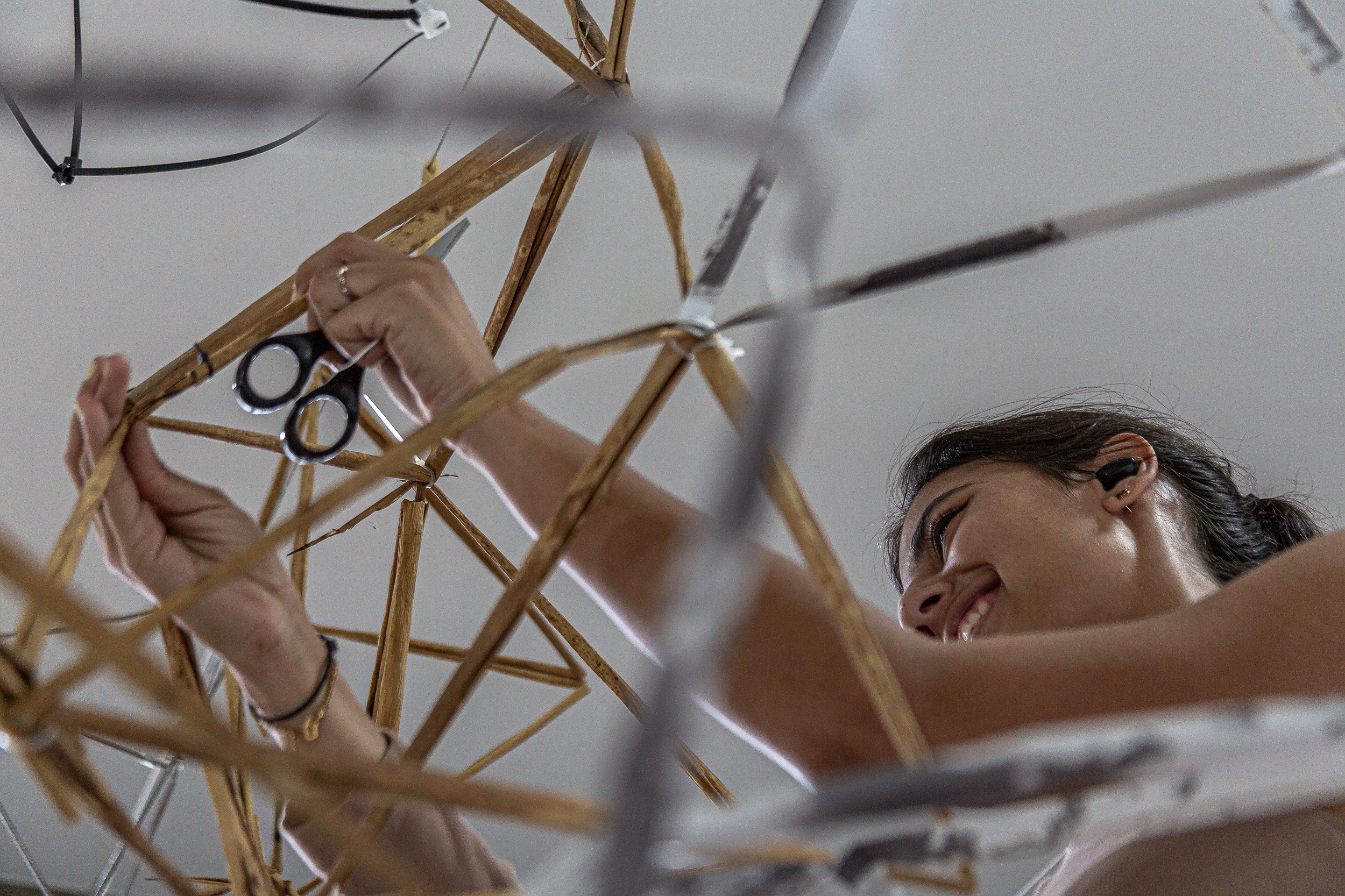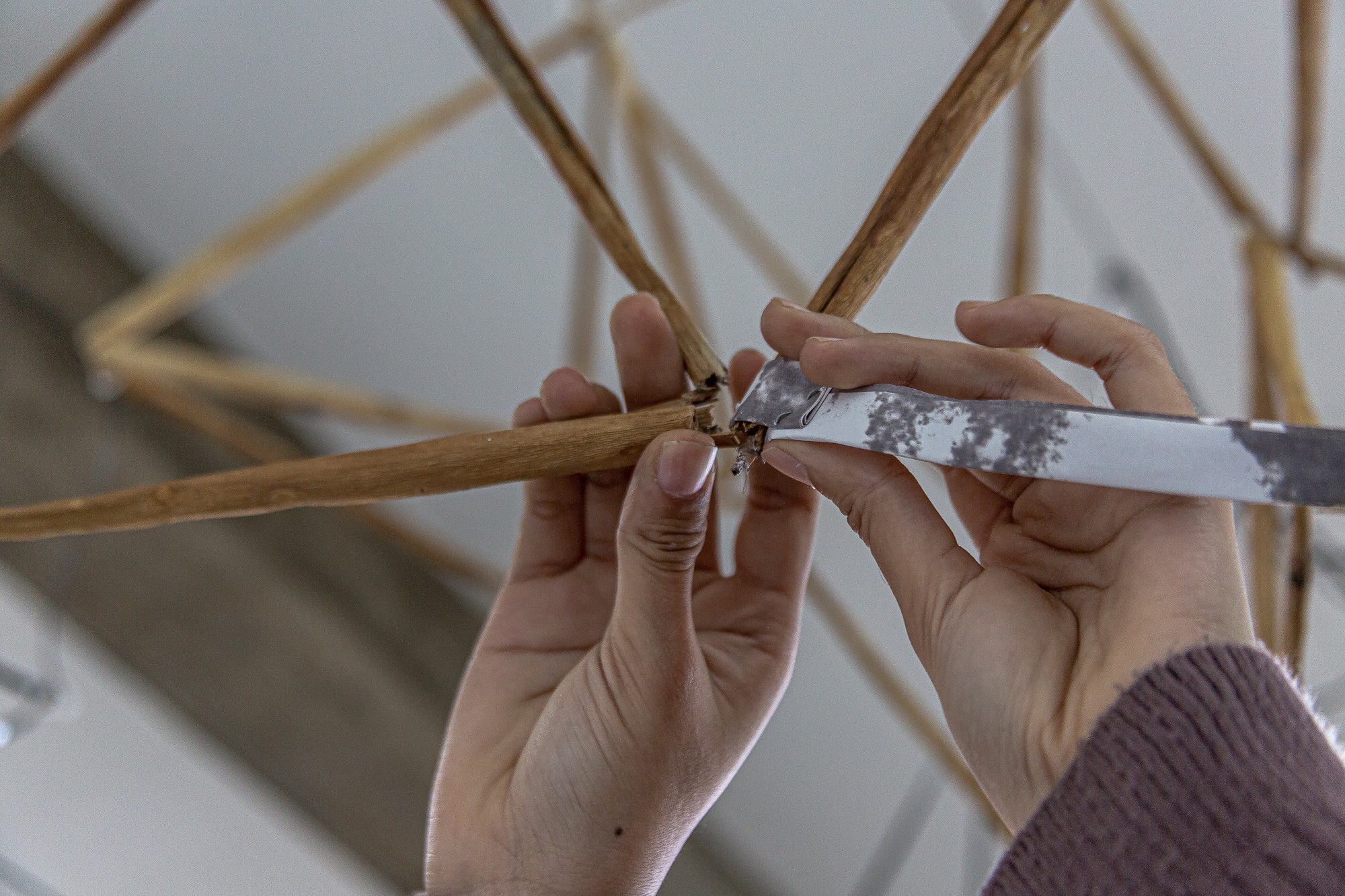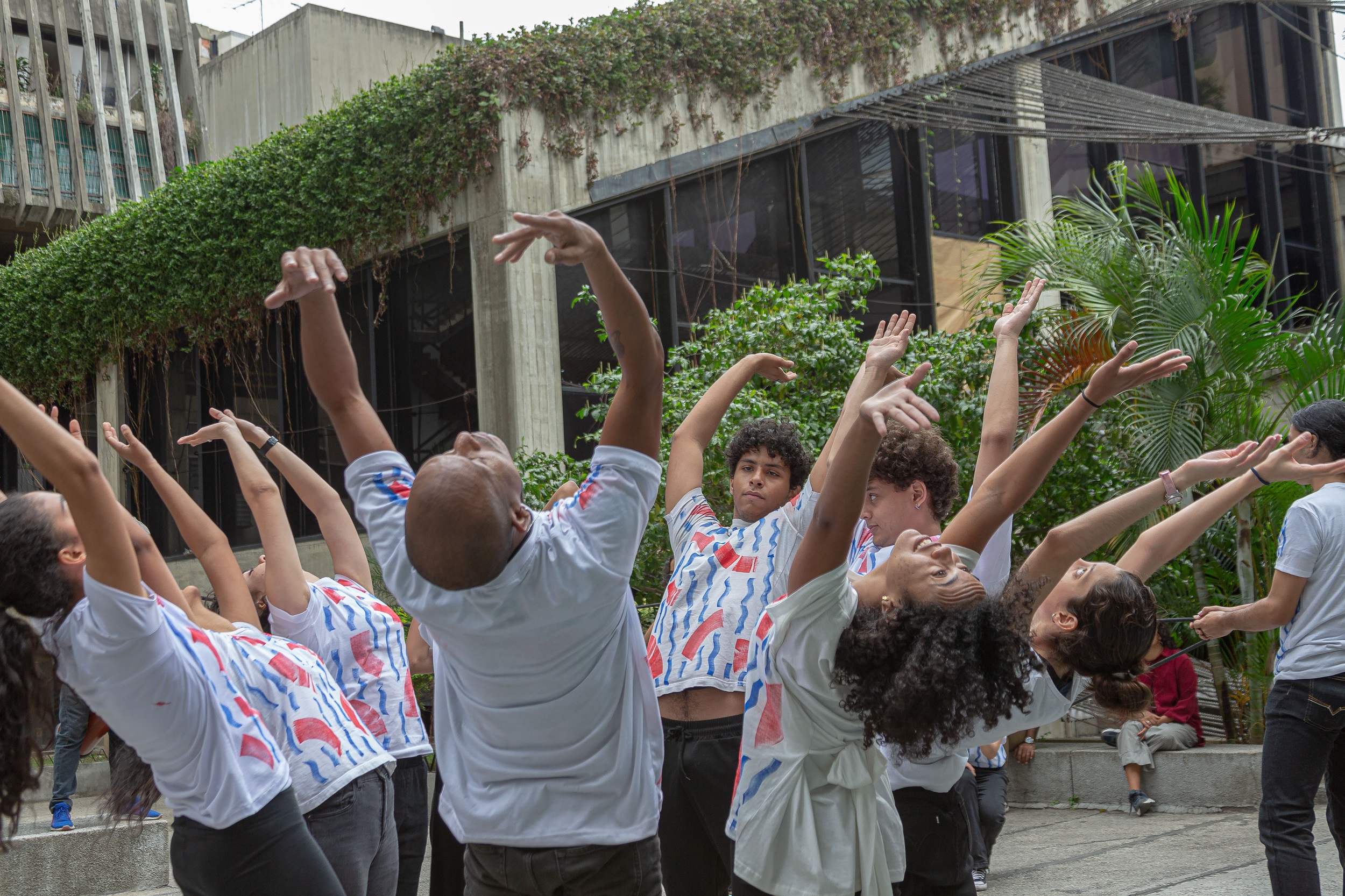04/11/2024 16:00 — 06/01/2024
Collective Reticulárea: Communal Cartographies to Open at Sala Mendoza, in Caracas, Venezuela

Collective Reticulárea: Communal Cartographies. Installation at Sala Mendoza, 2024. Photo: Josseline Chalbaud.
The artistic and pedagogical legacy of Venezuelan-German artist Gego is reactivated in a contemporary light in Collective Reticulárea: Communal Cartographies. This participatory project conceived by artist Miguel Braceli proposes a meeting and learning space around collaboration, weaving networks, and the affective bonds between art and the territory. The work was developed in collaboration with a network of artists and Venezuelan professors and students. The resulting enmeshment of this collective learning process will be displayed as a spatial experience at Sala Mendoza, in Caracas, starting April 11, 2024. The exhibition will unfold a public program gathering reflections on the presence of collaborative and pedagogical strategies in contemporary art.
Collective Reticulárea is organized by LA ESCUELA___, an artistic platform for collective learning and making in public spaces, founded jointly by Miguel Braceli and the international foundation Siemens Stiftung. Curated by Fundación Gego and Austrian curator and professor Stefanie Reisinger, Collective Reticulárea was developed within the framework of LA ESCUELA___'s on-site CLASSROOMS program. With this, the platform seeks to stimulate new dialogues and narratives about regional bonds, while exploring the potential of collaborative artistic and learning practices, and addressing issues of mobility and diasporas from affective ties woven on art and territory.

Collective Reticulárea: Communal Cartographies. Participatory project by Miguel Braceli. Exhibition at the Sala Mendoza in Caracas, 2024.
Curated by Fundación Gego and Stefanie Reisinger. Photo: Josseline Chalbaud.

Collective Reticulárea: Communal Cartographies. Participatory project by Miguel Braceli. Exhibition at the Sala Mendoza in Caracas, 2024.
Curated by Fundación Gego and Stefanie Reisinger. Photo: Josseline Chalbaud.

Collective Reticulárea: Communal Cartographies. Participatory project by Miguel Braceli. Exhibition at the Sala Mendoza in Caracas, 2024.
Curated by Fundación Gego and Stefanie Reisinger. Photo: Josseline Chalbaud.

Collective Reticulárea: Communal Cartographies. Participatory project by Miguel Braceli. Exhibition at the Sala Mendoza in Caracas, 2024.
Curated by Fundación Gego and Stefanie Reisinger. Photo: Josseline Chalbaud.

Collective Reticulárea: Communal Cartographies. Participatory project by Miguel Braceli. Exhibition at the Sala Mendoza in Caracas, 2024.
Curated by Fundación Gego and Stefanie Reisinger. Photo: Josseline Chalbaud.

Collective Reticulárea: Communal Cartographies. Participatory project by Miguel Braceli. Exhibition at the Sala Mendoza in Caracas, 2024.
Curated by Fundación Gego and Stefanie Reisinger. Photo: Josseline Chalbaud.

Collective Reticulárea: Communal Cartographies. Participatory project by Miguel Braceli. Exhibition at the Sala Mendoza in Caracas, 2024.
Curated by Fundación Gego and Stefanie Reisinger. Photo: Josseline Chalbaud.

Collective Reticulárea: Communal Cartographies. Exhibition at the Sala Mendoza in Caracas, 2024. Miguel Braceli’s educational and performative projects.
Curated by Fundación Gego and Stefanie Reisinger. Photo: Josseline Chalbaud. Courtesy: LA ESCUELA___.

Collective Reticulárea: Communal Cartographies. Exhibition at the Sala Mendoza in Caracas, 2024. Miguel Braceli’s educational and performative projects.
Curated by Fundación Gego and Stefanie Reisinger. Photo: Josseline Chalbaud. Courtesy: LA ESCUELA___.

Collective Reticulárea: Communal Cartographies. Exhibition at the Sala Mendoza in Caracas, 2024. Gego’s educational projects.
Curated by Fundación Gego and Stefanie Reisinger. Photo: Josseline Chalbaud.
“The visible outcome is never the entire piece, as the process of its genesis is to be considered,” notes Reisinger. The project has been in progress since December 2023, through an open call for artists, educators, and people linked to Gego's work. Thus, Collective Reticulárea is composed of modules-pieces made up of various materials, sent from countries such as Peru, Colombia, Argentina, Mexico, the United States, the Dominican Republic, France, the United Kingdom, Germany and Spain. These fragments were added to the spatial developments built by university students from different parts of Venezuela: Taller X of the Faculty of Architecture and Urbanism of the Universidad Central de Venezuela in Caracas (led by professor Diego González); the School of Visual Arts of the Universidad de Los Andes in Mérida (led by professor Analy Trejo); and the School of Architecture of the University of Margarita (led jointly by professors Gustavo Izarra and Amanda Soriano).

Educational project with pupils of the Escuela Comunitaria SHEKINAH, San Blas, Petare, Caracas. November 2023. Photo: Jesús Briceño.

Educational project with pupils of the Escuela Comunitaria SHEKINAH, San Blas, Petare, Caracas. November 2023. Photo: Jesús Briceño.
This addition was intended to stimulate collaborative learning and inventiveness, as participants were invited to build their modules-pieces from the possibilities and limitations of their contexts. In this way, the project dialogues with Gego's most emblematic work, the Reticulárea, not from mimetic intention but "from a symbolic place, as a communal cartography of expansive forms—Braceli explains—approaching the node as a design object, but also as an exchange and meeting space."
Reticulárea is one of Gego’s most representative works, for concretizing her research on spatial experience and drawing in the void. It consists of the spatial development of joints between linear pieces that, when assembled together, form an immersive whole: a rhizomatic structure of an endlessly expansive nature.
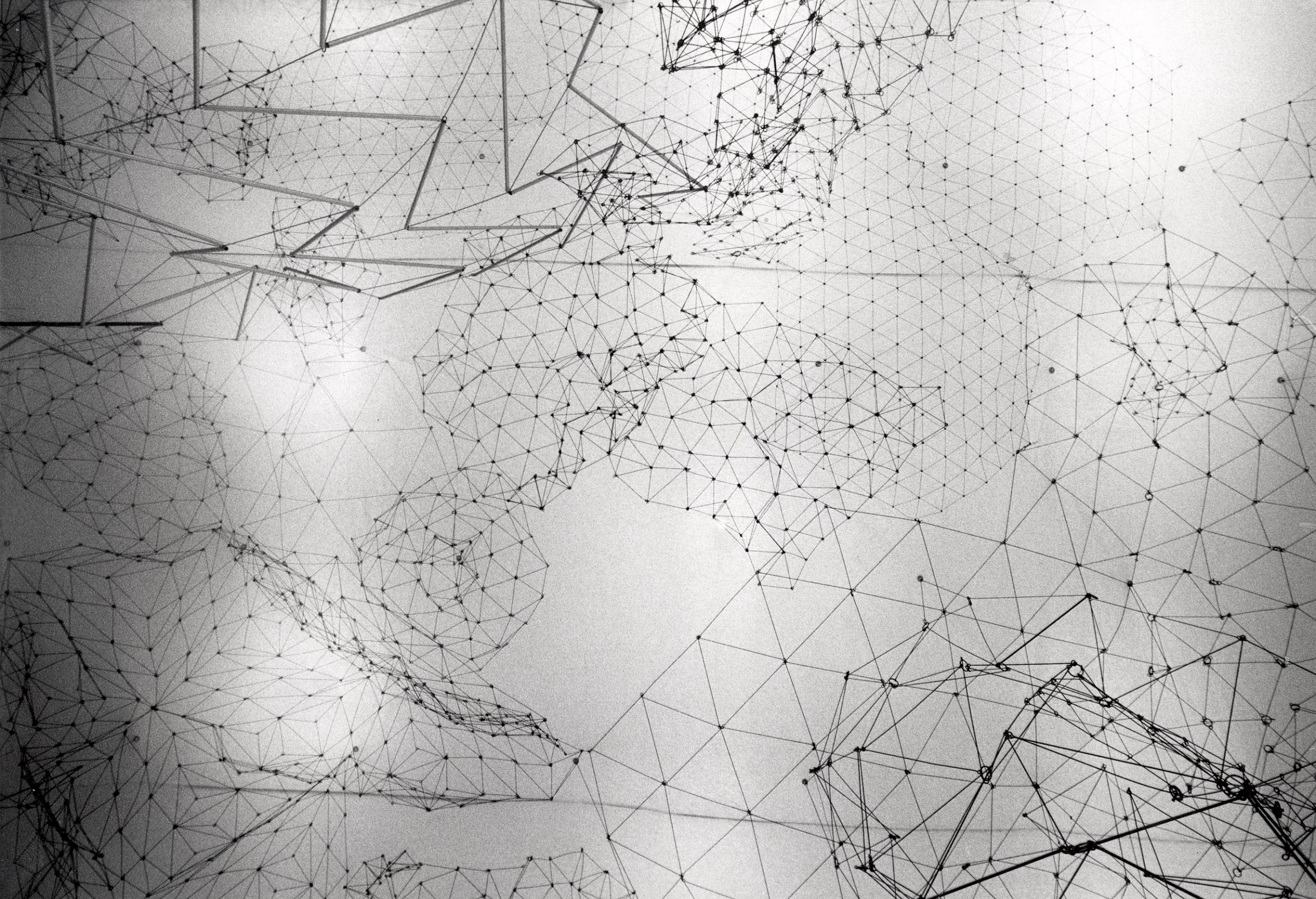
Gego: Reticulárea CIR, Center for Interamerican Relations (Nueva York, 1969). Courtesy: Fundación Gego.
Collective Reticulárea allows redimensioning Gego’s work “as a political communal territory through the link.” The project hopes to build a different cartography of the continent, where bridges, flows, and exchanges replace geopolitical borders, thus drawing a new network.
Collaboration
From a present point of view, Braceli emphasizes an aspect of the Reticulárea that, “until now, has not been fully unfolded (educational and collaborative aspects)—comments Reisinger—[creating] a social space for communal experience in a practical (working together) and conceptual manner (shared history).
The process of creating the connective points of a "communal cartography" required the active participation of a community. A network of Venezuelan artists and curators living abroad allowed collecting the pieces sent in response to the international open call. Thus, the collaborations from artists, researchers, educators, and people linked to Gego's work, were received in the workshops of Esperanza Mayobre, Lucía Pizzani, Jaime Gili, Elías Crespin, Fabiola Arroyo, María Antonia Rodríguez, Beto Gutiérrez, Valentina Alvarado Matos, Augusto Gerardi, Miguel Braceli, Andrés Michelena, Federico Ovalles, Elisa Bergel Melo, Camilo Barboza and Gabriela Quero, as well as at the Goethe-Institut Venezuela.
All these pieces, now displaced, are added to the spatial installation that will open at Sala Mendoza, along with an exhibition of selected archives from Fundación Gego, foregrounding the artist’s teaching work. It will feature pedagogical exercises developed by some of her students at the Faculty of Architecture of the Universidad Central de Venezuela (1959-1967), as well as from her famous Seminar of Spatial Relations, which she taught between 1966 and 1977.
Also, the adjoining room will present a selection of Braceli's collective performances and previous educational projects based on dialogue, participation, and the intervention of public space. These works seek to expand the dialogue and point to the links and relevance of celebrating Gego’s artistic and pedagogical legacy.
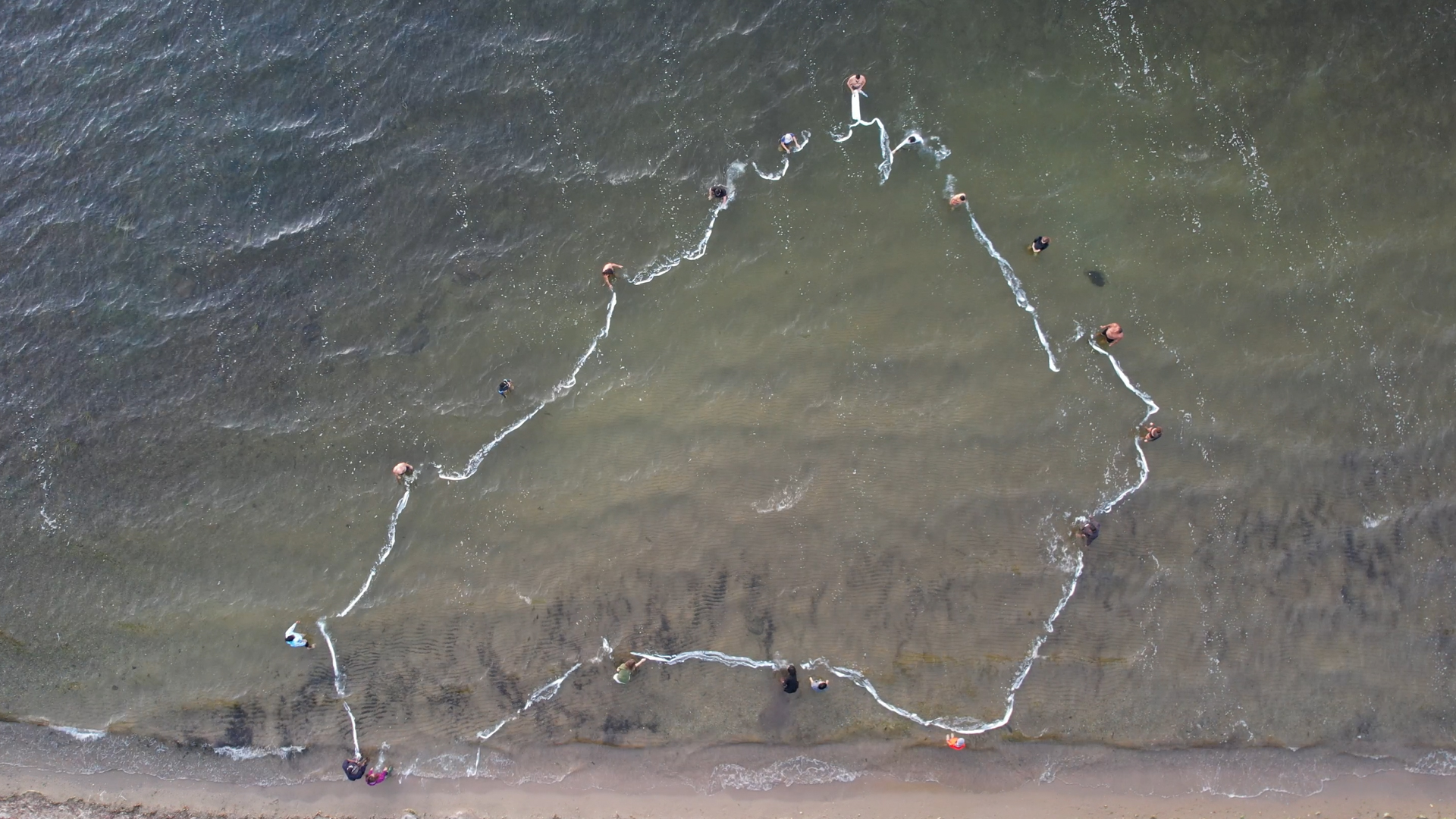
Miguel Braceli: The Last Swim. Collective Performance. Skowhegan School of Painting and Sculpture, Maine, 2022.
Public Program
Conceived with on-site and virtual components, the exhibition will host guided tours, on-site activities, and an online seminar with prominent international artists, researchers, designers, and curators who will reflect on Gego's expanded legacy, as well as her contributions to the global history of art.
The open seminar, to be held in May 2024, will feature a panel with artists Carolina Caycedo, Vered Engelhard and Tomás Saraceno, and curator Mónica Amor, as well as the on-site participation of Ruth Auerbach and Álvaro Sotillo. The program aims to foster dialogues and discussions around pedagogy, collaboration, and material experimentation in Gego's work.
Collective Reticulárea: Communal Cartopraphies project exhibition will open on April 11, 2024, at 4 PM, at the Fundación Sala Mendoza building, located on the Campus of the Universidad Metropolitana de Caracas, Urb. Terrazas del Avila, Edif. Eugenio Mendoza Goiticoa.
COLLABORATORS
Abigaile Méndez Ramírez, Albert Salazar, Alberto Asprino, Alberto Tejada Herrera, Alejandra Marín, Alicia Coles, Alicia Feaugas, Andrea Victoria Irazabal Puente, Andrés Michelena, Angel Almansor, Ángel D. Leiva, Ángel Marcano, Angelo Padilla, Anghelina Rangel Morales, Anghy Rondón García, Ani Villanueva, Annella Armas, Anthony Jose Villalobos Arreaza, Antonieta Valeska Flores Bastidas, Antonio Torres, Aura Nuñez, Ayar Abel Mendoza Yupanqui, Yhulianov Hortencia Concha Zavaleta, Isabel Paliza Vega, Angela Del Carmen Tenorio Rojas, Becerra Díaz Juan Pablo, Brenda Renison, Carlos Daniel Servin, Carlos Eduardo Rodríguez, Carlos Mendoza, Carlos Qintana, Cipriano Martínez, Christian Novoa, Claudio Valdebenito, Clismary Quintero, Cora Pereira Hors, Cori De Veer Bermúdez, Dania Ilbih, Daniel Briceño Brazón, Daniel Perez Mora, Daniela Catalano, Daniela Vásquez, Delia Edith Pérez Albarrán, Diana Gallardo, Diana Valentina Parra, Edgar Sebastián Márquez Maldonado, Edoardo De Armas Scaccia, Elena Saraceni Anzola, Elio José Benítez Sánchez, Eneko López Toro, Federico Ovalles-Ar, Fiorella Rondón, Franchesca Rubertone, Gabriel Gamero, Gabriela Valentina García Nuñez, George Lavarca Fernández, Gerardo Morantes, Giulia Coletta, Hugo Palmar, Inés Díaz Saubidet, Ingrid Ugueto, Daniel Escobar, Ira León, Ivan Salgrero Curiel, Janelis Chica, Jeiling Angelica Rodríguez Varela, Jessica María Santana, José Luis Delgado, Jesús Moreno-Granados, Jonathan Carvallo Salas, Jorge Eduardo Rosas, Jose Luis Castillo Segovia, Juan David De Freitas Ferreira, Juan David Dugarte Villegas, Juan Pablo Becerra Díaz, Karla Montauti, Leonardo Martinez Hlawacz, Lihie Talmor, Lisandro Castro, Lotta Stöver, Lucina Itzel Pedrozo Lara, Luis Zorrilla, Luisana Velasco, Manuel Herrera, Marbelis Teresa Gutierrez Herrera, Marcela Antipan Olate, María Casto Pastrano, María Celeste Trotta, María Cristina Salgado Gereda, Maria Del Carmen Reyes Garrido, María José García Vela, Maria José Labrador Mora, María Manuela Marquéz Madriz, Mariana Alvarez, Mariana Lugo, Mariana Victoria Rojas Monzalve, Mariangel Gabriella Pacheco Avendaño, Mariangel Marín, Mariangeles Calderin, Mariángeles Soto Díaz, Mariel Fuentes, Michelle Gordillo, Misael Carpio, Muu Blanco Ángulo, Nadia Benatar, Natalia Volpe, Nathalia Velásquez, Nicolás Lapadula, Nilda Perez Peirano, Noremis Cedeño, Oriana Rios, Paola Burigo, Paola Vielma, Patricia Van Dalen, Puentes Entre Cadenas, Rawen Maklad, Reynalíd Carolina Berrio Salcedo, Roberto Ramirez Plessmann, Salomé Rojas, Silvia Soonets, Silvia Soonets, Susan Applewhite, Susana Montilla, Valeria Caribay Vasquez Pacheco, Verónica Florville, Verónica Rodríguez Angulo, Vicente Antonorsi, Victoria Diaz Saravia, Victoria Medina, Victoria Romero Ibañez, Vilena Figueira, Vladimir Vivas Suarez, Wilfredo Gil, Xiomara Sánchez, Yadersy Wetter, Yulietzi Noriega.
